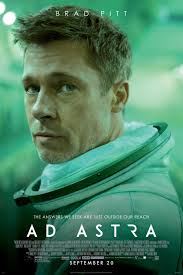Director: James Gray
Cast: Brad Pitt, Tommy Lee Jones, Ruth Negga, Donald Sutherland, Liv Tyler
Runtime: 124 minutes
Rating: PG-13
A Stellar Odyssey, or a Black Hole of Emotion?
James Gray’s Ad Astra boldly aims for the stars but lands somewhere in the nebulous space between intimate character study and sprawling sci-fi epic. Anchored by Brad Pitt’s magnetic performance, the film takes us on a meditative journey across the cosmos, exploring the human condition as much as it does alien planets. It’s Apocalypse Now meets 2001: A Space Odyssey, filtered through a brooding lens that asks more questions than it answers.
Gray wastes no time establishing the stakes in this slow space opera. Astronaut Roy McBride (Pitt) is tasked with a mission to stop mysterious energy surges threatening Earth, surges that are possibly linked to his father, Clifford McBride (Tommy Lee Jones), a legendary astronaut long presumed dead. What begins as a high-stakes rescue operation morphs into an existential exploration of familial bonds, human isolation, and our seemingly infinite need for purpose.
Pitt delivers one of his career-best performances, bringing quiet intensity to Roy’s emotional isolation. His voiceovers—a mix of melancholy and detachment—ground the narrative, though at times, they risk tipping into over-exposition. The supporting cast, particularly Ruth Negga and Donald Sutherland, are criminally underused, their characters flaring briefly before fading into the void like a dying star.
Visually, Ad Astra is breathtaking. Cinematographer Hoyte van Hoytema (Interstellar) crafts a stunning tapestry of interstellar vistas, from the eerie silence of the moon’s surface to the neon-drenched chaos of a Martian outpost. The production design feels tactile, grounding the futuristic tech in a gritty realism. Max Richter’s haunting score amplifies the film’s meditative tone, though its persistent solemnity risks feeling one-note. This is best viewed in the 4k version if you can as it brings the colours and the intensity of the piece to life as lower resolutions loose some of the impact.
While Ad Astra excels as an introspective character study, its pacing and narrative makes it a bit of a slog to get through. The central mystery surrounding Roy’s father unfolds predictably, and some of the more thrilling sequences—pirates on the moon, an inexplicable rabid baboon attack—feel incongruous with the film’s otherwise reflective tone.
Gray’s ambition is commendable, but the film occasionally stumbles under the weight of its philosophical musings. The grand themes of loneliness, legacy, and the search for meaning are compelling, but they lack the emotional resonance of, say, Arrival or Gravity. Instead, Ad Astra often feels like it’s reaching for profundity without fully grasping it.
Verdict
Ad Astra is a visually stunning and emotionally ambitious odyssey, bolstered by Brad Pitt’s restrained, introspective performance. However, its uneven pacing and occasional narrative missteps make it feel more like a near-miss than a full-blown masterpiece. A contemplative space opera that’s as likely to mesmerize as it is to frustrate. The story is sound but the execution and the length makes sitting through this in one go a hard thing to do. The acting is f8ne the idea and story would be acceptable but, its just too long and slow for what it is. The story would have us believe that the earth was in dire peril but from the actions and the pace of this it would be more like a sloth getting round to it when they can be bothered this an actual save the earth scenario. All in all if you have the time to kill then by all mean give this a go at higher resolution it is worth it as an artwork but, as an entertainment its a bit too slow.
Rating: 3/5









